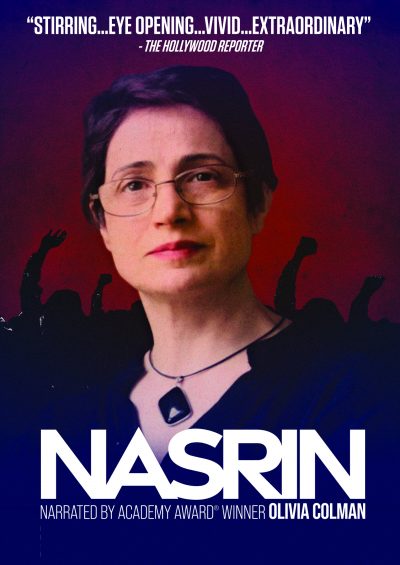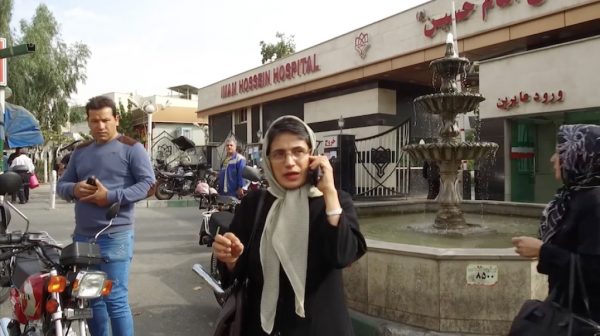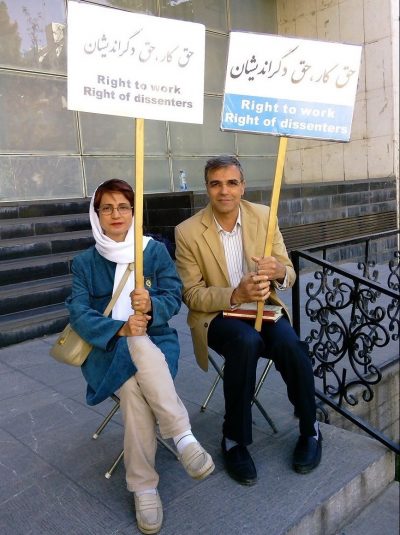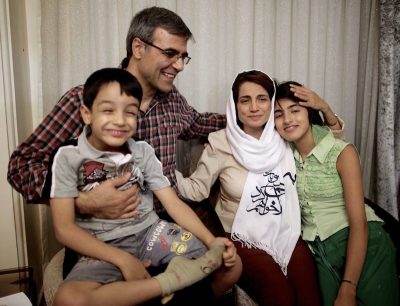“Nasrin”(2020). Cast: Nasrin Sotoudeh, Ann Curry, Reza Khandan, Nima Khandan, Mehraveh Khandan, Narges Hosseini, Jafar Panahi, Shirin Ebadi, Taghi Rahmani, Marietje Schaake, Monsoureh Shojaee, Olivia Colman (narrator). Director: Jeff Kaufman. Writer: Jeff Kaufman. Web site. Trailer.

We can all use a little help from time to time. There are even times when we can use a lot of it, and, in those instances where we’re up against seemingly impossible odds, such as being under the thumb of despotic authority figures, it’s positively essential. Thankfully, there are champions out there who are willing to rise such occasions, even when it comes to putting their own well-being on the line, as illustrated in the new biographical documentary, “Nasrin.”
Nasrin Sotoudeh may not be a familiar name to many of us. But, to countless Iranians who have come under attack by the Islamic state’s authoritarian fundamentalist rule, she has been a godsend. As one of the nation’s (indeed, the world’s) most passionate and prominent human rights advocates, Nasrin is an attorney who speaks her mind and fights aggressively for her clients, often confronting a brutal, autocratic government and a capricious, unreliable court system. In her many years of practice, she has fought hard in the defense of women, children, ethnic minorities (such as the Iranian Kurd community), members of the LGBTQ+ community, religious minorities (such as practitioners of the Bahá’í faith), persecuted artists and outspoken political reformers against overblown charges brought by a regime seeking to suppress opposition at any cost, including instances involving blatant illegality, unethical conduct and outright lying. And, for her efforts, she has gained international notoriety but at a cost to herself, including foreign travel bans, restrictions on practicing law, imprisonment and threats of physical torture.
Nasrin has a history of defending those who have had no one to speak for them under such oppressive circumstances. This has included representation of high-profile figures, including activists, journalists and opposition politicians. At the same time, her work has also addressed caring for the needs of the innocent, such as protecting children in custody cases involving parents with known histories of abuse seeking to retain access to their youngsters brought before judges sympathetic to their causes.
Nasrin has been especially active when it comes to women’s rights. Given that more women than men graduate from college in Iran, she believes that they can play an important role in helping to shape the nation’s future but that they must have the freedom to do so to fulfill that role. That includes measures that many in the West may see as simple but that are nevertheless crucially important to the women of Iran.
For example, she has quite aggressively challenged government dictates requiring women to wear hijabs in public, the traditional Muslim veil denoting modesty. It’s a practice that she believes should not be governed by legal sanctions, and it’s one that an increasing number of younger Iranian women have begun to publicly rebel against. She has taken on cases involving clients who have willingly defied the requirement, and Nasrin herself only complies with it when out in public, not when meeting with clients in her office.

On a wider scale, Nasrin was a signatory to the Campaign for One Million Signatures, an initiative aimed at collecting the support of one million women to petition the government for the elimination of laws aimed at discriminating against women. She would later defend many of the women who were arrested for their involvement in the campaign. In a similar vein, Nasrin also stood up in support of those who were arrested in a government crackdown against protestors of Iran’s disputed 2009 election results that brought the brutal regime of Mahmoud Ahmadinejad to power. Clearly, she’s not been one to back down from a fight – and always doing so with a cool, calm and collected head.
Such courage and personal fortitude seem to have always come easily to Nasrin. She has long been involved in a variety of efforts where she has openly spoken her mind, much to the consternation of Iranian officials. This resulted in a raid on her office in 2010 while defending a client accused of security offenses, an incident that led to charges being filed against Nasrin for spreading propaganda and conspiring to harm state security. She was subsequently sentenced to jail time in Iran’s notorious Evin Prison, a term that was later reduced and resulted in her early release in 2013.
But that was not the end of the governmental harassment. In 2018, halfway through the filming of this documentary, Nasrin was arrested again, this time on a number of charges, including membership in a human rights organization, threatening national security, and “stoking corruption and prostitution,” accusations that led to conviction and sentencing of 38 years’ prison time and 148 lashes. It’s believed that her efforts to confront the government’s position on the practice of wearing hijabs in public contributed significantly to this campaign against her. Efforts to secure her release for this act of governmental overreach have been instituted, but Nasrin remains imprisoned at this time.
The passion that Nasrin has brought to her work also seems to have come naturally to her in her dealings with others outside the courtroom. That’s perhaps most apparent in her loving home life with her husband, Reza Khandan, and her two children, Mehraveh and Nima. But it can also be seen in meetings with her clients, such as Narges Hosseini, a young woman on trial for her defiance to publicly wear a hijab. In addition, Nasrin is a passionate supporter of the arts, believing it to be a cause that deserves greater support, one that authorities should encourage instead of its relentless campaigns of pointless persecution. When seeing how fervently Nasrin throws herself into these endeavors, it’s easy to see how that passion translates into the zeal for her work.

Those qualities of courage and passion are essential at a time like this in Iran. In a nation where the youth is growing increasingly disenchanted with a government determined to squelch expression and opposition, the population needs advocates who will heroically step forward to represent them and fight for their rights and freedoms. Nasrin is a shining example of this, and she and those like her need to be able to live out their destiny and help those seeking a better future, free of tyranny and repression.
When someone seeks assistance with their legal issues, they often call upon individuals who possess the kinds of qualities that Nasrin so freely and naturally exhibits. And those attributes come to her so readily because she’s firmly rooted in the beliefs that drive them. That’s key to making the conscious creation process function, the philosophy that maintains we manifest the reality we experience through the power of these metaphysical resources. It’s unclear whether she has ever heard of this doctrine – she even admits in the film that her spiritual practices are a personal matter that is no one else’s business – but, based on her track record, it’s apparent she has become masterful at its principles.
Nasrin’s passion for her convictions is a direct result of the beliefs that underlie it. She understands the need to fight for the rectification of the many wrongs that have been thrust upon the Iranian people, be they legal and/or moral in nature. She’s unwilling to accept the dictates and judgments that have been and continue to be inflicted upon her peers. She also recognizes that circumstances have to change, in large part because young Iranians increasingly won’t stand for it. Fortified by such resolve and backing, it’s easy to forge beliefs and engage in activities to pursue the fulfillment of these objectives.
It’s apparent that many others agree with her, too, including some that may seem to be unlikely supporters. Such is the case with the parents of one of her clients, Narges Hosseini, a young woman arrested for failure to wear a hijab in public. Even though Narges is convinced of the validity of her radically defiant stance, she comes from a family with a more conventional and compliant background. Nevertheless, despite this seeming disconnect, the family supports both Narges for her commitment and Nasrin for her fierce determination to defend their daughter. They know Nasrin believes in what she says and that she will do everything in her power to defend her client and her position.
Nasrin’s passion for her work owes much to her ability to face her fears and live heroically. This is key to becoming a proficient conscious creator, for fears often hold us back from proceeding with our plans, and beliefs in it generally contradict (and consequently cancel) anything we attempt to undertake. Through her work, Nasrin has not hesitated to publicly express her views, even in the face of an autocratic government and legal system in full knowledge of what could (and did) happen to her for doing so. That makes her a force to be reckoned with, someone who, in the opposition’s view, must be dealt with harshly if her opinions are to be suppressed, conditions that don’t deter her, despite the consequences.
This passion is also attributable to who she is as a person, as the film so clearly shows, especially in her life outside her professional pursuits. The warmth she shares with her family, her demonstrable concern for her clients and her devotion to the arts – all of which are amply depicted here – give viewers a window into her character. And these qualities translate not only into the approaches she takes to her personal life, but also into her professional life. It’s no wonder that others place so much confidence in her and her abilities; they know she’s committed and will give her all for their cases.

By remaining committed to this stance, Nasrin is clearly practicing her own form of value fulfillment, the conscious creation concept associated with us being our best, truest selves for the betterment of ourselves and those around us. Nasrin’s willingness to put herself on the line for her principles, even in the face of dire consequences, demonstrates her commitment to her causes. She sees it as her destiny, her purpose in life, and, considering what she’s up against, it’s a perilous course, to be sure. But, given what’s at stake, it’s a noble pursuit that she feels compelled to follow, one that, when successful, will benefit many individuals in need of relief and support from their travails.
“Courage under fire” is an expression that could best be used to describe the subject of this superb film. Director Jeff Kaufman’s excellent documentary looks at Nasrin’s heroic life, chronicling the many challenges she has faced and unflinchingly depicting the stalwart defiance she has demonstrated in the face of odds frequently stacked against her. The film candidly and sensitively illustrates the counselor’s family life, her involvement in the arts community, and the heartfelt compassion she genuinely feels for her clients and causes, proof of the authenticity that fuels her actions. It also includes interviews with colleagues and those who have spoken with her over the years, such as journalist Ann Curry, director Jafar Panahi (who featured Nasrin in a cameo in his film “Taxi” (2015)), Iranian activist and human rights attorney Shirin Ebadi, and European Parliament member Marietje Schaake. Clandestinely shot by film crews in Iran under the threat of prosecution and narrated by Oscar winner Olivia Colman, “Nasrin” paints a truly remarkable portrait of a truly remarkable individual. The film is available on DVD and online streaming.
Rising up against formidable opponents is, no doubt, a daunting prospect, especially when the chances of success are far from guaranteed. Yet, given what’s at stake, it’s often necessary if change is ever going to come. Fortunately, there are advocates who agree to take on such challenges, to fight for what they know is right. And, even when there is little chance of victory, putting such transgressors under the spotlight of public scrutiny can go a long way toward effecting change. Nasrin Sotoudeh is one such activist, and we should be grateful, both for her and for this film that so compellingly tells her story.
Note: For more on Nasrin, check out a Mission Unstoppable interview by host Frankie Picasso and yours truly with director Jeff Kaufman and producer Marcia Ross, available on video by clicking here or via podcast by clicking here. And, to help support Nasrin, click here.
Copyright © 2021, by Brent Marchant. All rights reserved.

No comments:
Post a Comment